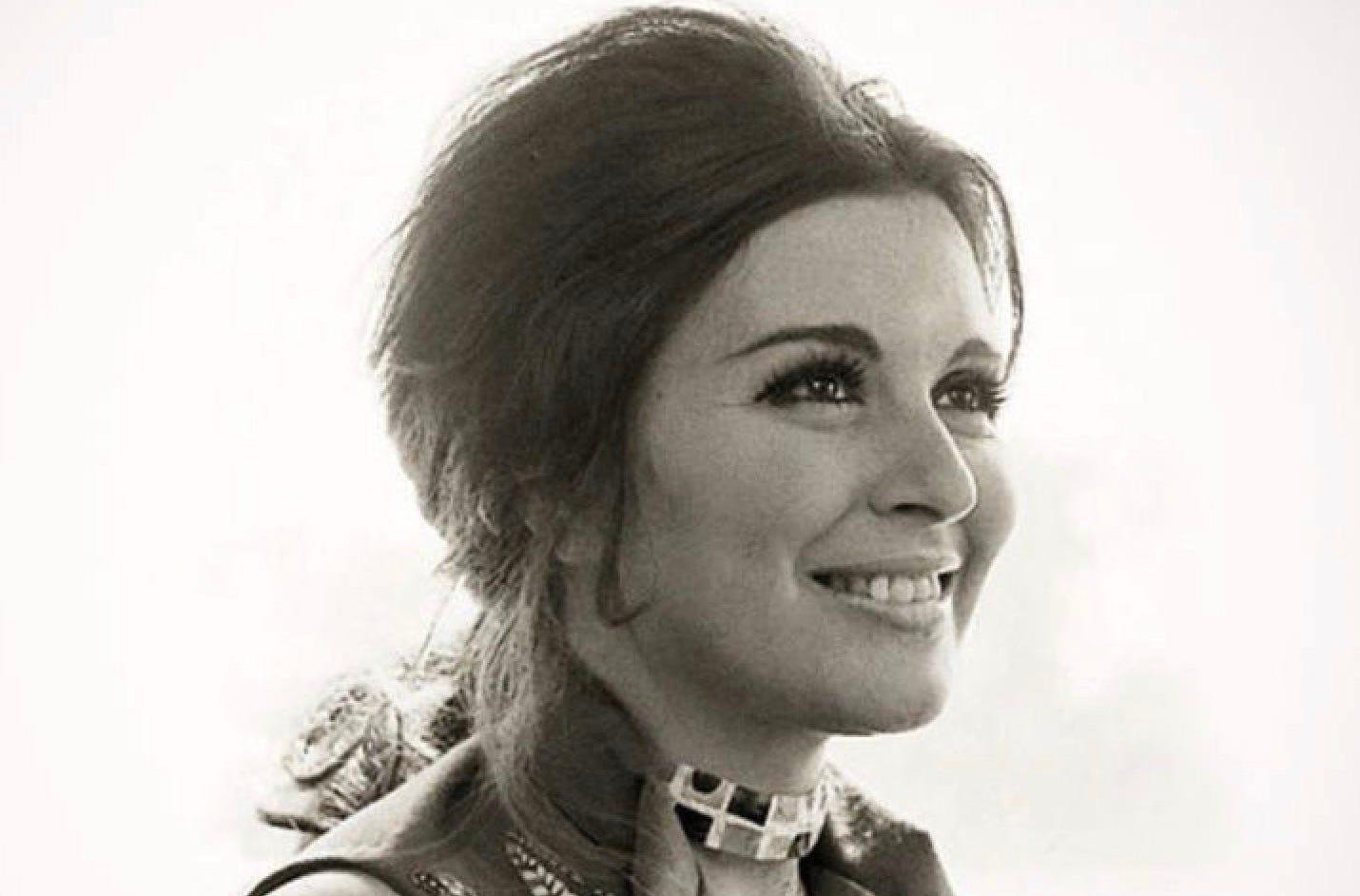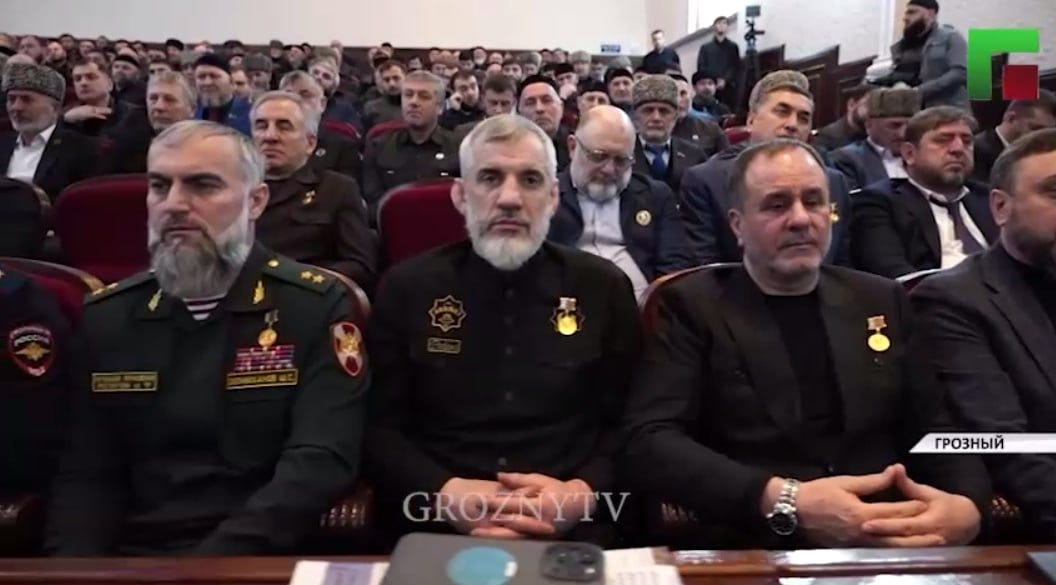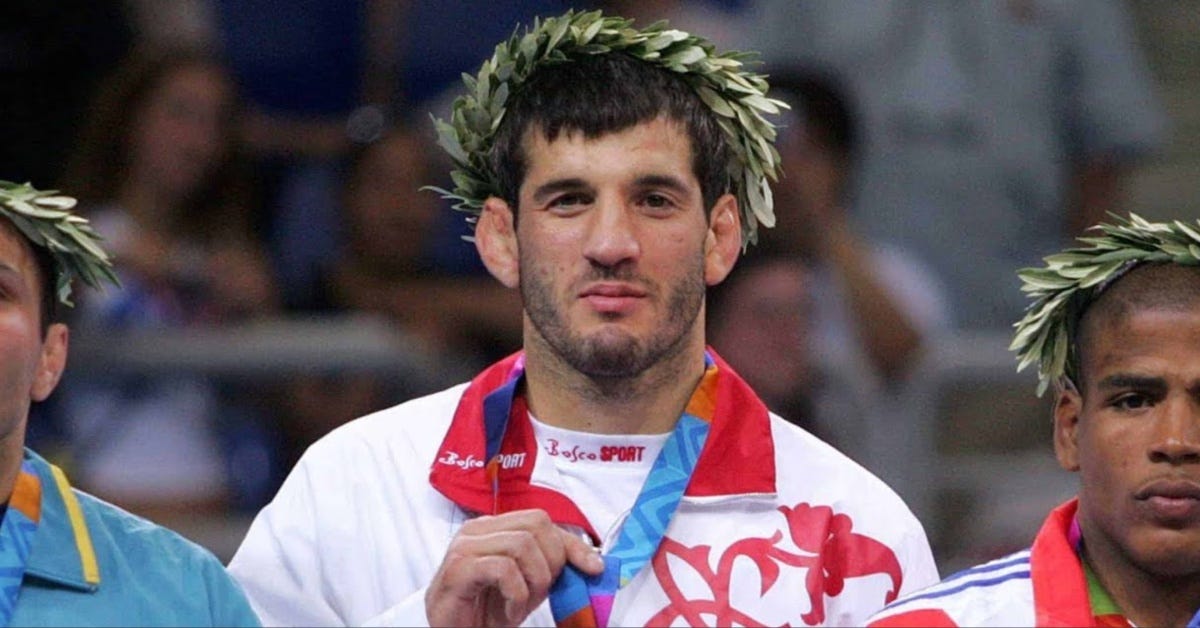Death by Balcony
I come from a country where mysterious "balcony deaths" claimed the lives of actors, politicians, and notorious spies. Olympic legend Buvaisar Saitiev's death bears those same suspicious hallmarks.
Welcome to Sports Politika, a media venture founded by investigative journalist and researcher Karim Zidan that strives to help you understand how sports and politics shape the world around us. Our mission is to offer an independent platform for accessible journalism that raises awareness and empowers understanding.
If you share this vision, please consider supporting us by joining our community and becoming a paid subscriber. We are currently running a 20% promotion on annual subscriptions, which you can take advantage of below.
I grew up in Egypt, where plummeting to your death from a balcony isn’t always an accident.
Over the years, balcony deaths have claimed the lives of Egyptian politicians, actors, and notorious spies. In 1973, Egyptian ambassador to Britain General Leithy Nassif fell to his death from a balcony in London. Four years later, Ali Shafik, an alleged arms dealer and secretary in the office of former Egyptian Vice President Abdel Hakim Amer, shared a similar fate.
In 2001, legendary actor Soad Hosni—dubbed the “Cinderella of Egyptian cinema”—fell to her death from a London apartment balcony. British authorities ruled it a suicide, but her sister later filed a legal complaint, accusing Egyptian government officials of orchestrating her murder. At the time, Hosni was reportedly working on memoirs that could have exposed several high-ranking officials in a sex scandal.
Six years later, in 2007, Ashraf Marwan—a spy, alleged double agent for Israel, and son-in-law of Egyptian president Gamal Abdel Nasser—also fell to his death from the balcony of his fifth-floor London apartment.
At the time, witnesses claimed to have seen “Middle Eastern-looking persons” on the balcony after Marwan’s fall but no one was ever held responsible. Marwan’s widow, Mona Nasser, later accused Israel’s Mossad spy agency of having killed her husband, who at the time was working on his memoirs. According to Marwan’s family, the only known copy of his memoirs, which he was close to completing, allegedly disappeared from his bookshelves on the day of his death. The three volumes, each around 200 pages, as well as the tapes on which Marwan had dictated the text, have never been recovered.
“I wasn’t there when it happened, but I’m certain someone came in and just threw him over the balcony. He was very frail and could easily have been carried and thrown from the balcony,” Mona Nasser told the BBC in 2010.
There are plenty of other examples of Egyptians plunging to their deaths, including the 2014 death of blogger and activist Bassem Sabry. These mysterious falls have become so frequent in Egypt that they’ve almost formed a recurring motif in the country’s modern history.
“Is there some sort of a balcony phantom … that goes after every Egyptian who dares and stands [on] the balcony?” an Egyptian blogger asked following Marwan’s death.
This leads me to this week’s news that Buvaisar Saitiev, a three-time Russian Olympic freestyle wrestling champion who later became a member of the ruling United Russia party, was reportedly found dead after falling from a window in Moscow. His brother claimed that Saitiev may have accidentally fallen from the window of his third-floor apartment while doing chores.
Given the Egyptian experience with mysterious balcony deaths, I found Satiev’s death to carry the same suspicious hallmarks. The 49-year-old Chechen native was an influential figure in Russia, serving as a member of Russian Parliament and as an ally and advisor to Chechen dictator Ramzan Kadyrov.
While there is currently no evidence to suggest that Saitiev was murdered, or that his death was ordered by the Kremlin or Kadyrov, there are various reasons to suspect foul play.
Over the past few years, a series of mysterious deaths have claimed the lives of prominent Russian figures, including oligarchs, businessmen and oil executives—many of whom reportedly fell from windows under suspicious circumstances. In November 2024, oligarch Mikhail Rogachev—a former Putin ally who opposed Russia’s invasion of Ukraine—was found dead after falling from his Moscow apartment. Months earlier, a Russian judge known for targeting the Kremlin's foes was found dead after falling from a high window in the Russian capital.
Kadyrov, too, has a history of disposing of former allies who’ve outlived their usefulness. In 2023, I broke a story the mysterious death of Abdul-Kerim Edilov, a Chechen UFC fighter who rose to become Chechnya’s deputy prime minister and one of Kadyrov’s closest confidants. Edilov had reportedly fallen out of favor with Kadyrov and his inner circle—a rift that ultimately cost him his life.
I first wrote about Saitiev back in 2016, shortly following my latest trip to Russia at the time. I had just started writing about the intersection of sports and politics and was keen to use him as an example of how sports in the North Caucasus region were foremost a too for political control. I delved into how Saitiev was recruited by Kadyrov’s father, Akhmad, to be a glorified mascot representing the positive impacts of sports on Chechen society in the aftermath of two civil wars with Russia.
Following Akhmad Kadyrov’s assassination in 2004, the Chechen leader’s son, Ramzan, followed through on his father’s plan and maintained a close relationship with Saitiev, even going so far as to use him to gain control of one of neighbouring Dagestan’s largest cities.
To understand the possible motives behind Saitiev’s death, we must first examine his role as both a vehicle for Kadyrov’s political ambitions and a symbol of the ideal Chechen man in Putin’s Russia. With that in mind, I’m sharing my 2016 article on Saitiev below, hoping it offers insight into the context and circumstances surrounding his mysterious passing.
Iron fist: Sport as a means to an end in the North Caucasus [Open Democracy, Aug. 4, 2016]
There is a particular design at work in Russian sports culture — a marked trajectory that begins with combat sports excellence and culminates in political influence.
The prestige associated with combat sports in the North Caucasus is rooted in the region’s love for martial arts that flourished here over the last century, as well as overwhelming pride in the fighting spirit of their highlander ancestors. It sets you on a violent path that nevertheless pivots away from extremist alternatives. Those who rigidly adhere to this path enjoy the ultimate form of social mobility in Dagestan.
Kadyrov’s sports socialization
Shortly after the end of the Second Chechen War, renowned Olympic hero Buvaisar Saitiev and his younger brother, fellow Olympic medalist Adam Saitiev, were summoned by newly-minted Chechen president Akhmad Kadyrov. The brothers were given little information about the reasons for their rushed meeting with the former rebel, and unbeknownst to them, Kadyrov had already planned their respective futures.
In an attempt to turn away from further warfare with Russia, Akhmad Kadyrov constructed a plan to divert Chechen youth from radical fundamentalism. And to find an alternative outlet for troubled young people’s aggression, Kadyrov enlisted the help of the Saitiev brothers. They were to be part of his social policy — glorified mascots who would represent the positive impact of sports socialisation.
When Kadyrov’s son, Ramzan, took over for his assassinated father, Buvaisar became the loyal advisor to a controversial leader with a series of human rights atrocities to his name.
Acquiring Saitiev was essential for the Chechen government. The first Chechen to win a gold medal at the Olympics, he was widely considered to be the greatest freestyle wrestler in the history of the sport. The remarkable achievements he compiled during that 14-year career, which included six World Championships, three Olympic gold medals, six European titles, and four Russian championships, ensured that Saitiev was idolised in the North Caucasus. During a time when Chechens were considered terrorists and thugs, Saitiev was proof that they were capable athletes.
While this appeared to be a natural transition for Saitiev, it was part of a much larger ambition to win back the long-lost town of Khasavyurt.
The struggle for Khasavyurt
Located on the border with Chechnya, Khasavyurt is a town that has deep-rooted fundamentalist sentiment and a history of tension between Chechens and the Avar ethnic group in Dagestan.
During the Second World War, Khasavyurt belonged to Chechnya until Soviet Leader Joseph Stalin expelled the Chechens from their homeland in 1944. The town became a part of Dagestan and remains so to this day. A portion of Chechens returned to their hometown decades later and now make up 28% of the local population, the second largest ethnic group in the city.
More recently, Khasavyurt became the site of an ongoing political struggle to determine who will control the second largest city in Dagestan.
This is where Buvaisar Saitiev comes into play.
The wrestling legend represents an opportunity for Kadyrov to seize control of a region that was once under Chechen rule. Saitiev, an ethnic Chechen born in Khasavyurt, is a near-perfect candidate to run in that particular district. His background as a national hero will likely garner support from the region’s youth, while support from his current employer Kadyrov will ensure that the Chechen contingent within the city will vote for him. A win would mean that a member of Kadyrov’s inner circle will have authority over a city that does not belong to Chechnya.
“The town of Khasavyurt, which borders Chechnya, is important to Kadyrov because he considers it part of his sphere of influence and seems to want to extend this influence more deeply into Dagestan,” Caucasus expert and researcher Karena Avedissian told me. “Men under Kadyrov's command have already made several forays into Dagestan — including pursuing of man critical of Kadyrov online earlier this year — and the town, which mainly comprises Avars, Chechens, and Kumyks, is home to most of Dagestan's illegal business activities, so there are many powerful interests at play there.”
The two players involved in the political struggle are former mayor of Khasavyurt, Sagidpasha Umanakhov, who is currently Dagestan’s minister for transport and communications, and Kadyrov. The tension between Kadyrov and Umakhanov is particularly palpable, as the former mayor hinted that the Chechen leader was behind an assassination attempt on his life. For Kadyrov, the goal is simple: limit Umanakhov’s power, as well as neutralise the regional People against Corruption Party (NPK) that is supported by Salafi Islamic clerics.
Once a proud Olympic champion, Saitiev has morphed into a political tool paraded for Chechen gain — the price paid to become part of the Kadyrov’s privileged elite
“Kadyrov has been antagonistic towards longtime mayor of Khasavyurt Saigidpasha Umakhanov, an ethnic Avar, and initially wanted Saitiev to fill the position,” Karena explained. “While this didn't work out and Umakhanov was able to place another ethnic Avar in the position, it seems clear that Kadyrov is looking for someone to lobby for Chechen Republic interests within Dagestan.”
Once a proud Olympic champion, Saitiev has morphed into a political tool paraded for Chechen gain — the price paid to become part of the Kadyrov’s privileged elite.
The politics of sport
To understand the magnitude of Saitiev’s story is to grasp the significance of sports culture in the Russian Federation. In the North Caucasus, sport is an escape from difficult local realities. It is also a way to channel aggression without inciting mass conflict. And a way to honour one’s Caucasus heritage without donning a papakha.
Sports in this region are not just used for entertainment purposes, but for political gain
It is important to keep in mind that sports in this region are not just used for entertainment purposes and societal concerns, but for political gain and the strategic realization of particular ambitions.
For some in positions of power, athletes are very versatile tools used to exercise control over a population or even, as in Saitiev’s case, for a power grab in a neighbouring republic.
The Russian government is aware of the domestic benefits and international prestige reaped from sports, and are willing to go to remarkable extents to legitimize that image. An example of this is the World Anti-Doping Agency (WADA) investigative report that accuses Russia of a state-sponsored doping program that benefited athletes during the 2012 Summer Games in London and the 2014 Winter Games in Sochi. If proven accurate, Russian officials, including Minister of Sport Vitaly Mutko and numerous FSB agents, will have orchestrated the manipulation of countless doping samples in order to boast Russia’s success at an international setting.
The sheer willingness to engineer large-scale corruption at multiple Olympics, as well as the decision to keep most athletes in the dark, highlights the extent to which Russia is willing to achieve sports recognition. Despite the political complexities burdening the nation, diplomacy through sports remains essential to Russia’s overall goals.
This strategic approach is also reverberated through the country’s hefty bid to host the 2018 World Cup. Despite difficult economic circumstances and sanctions imposed by the United States and other nations, Russia’s World Cup tournament is set to be the most expensive in history, with a total budget that could total $40 billion. While the price tag is sizeable one, it is a price Putin is willing to pay to ensure his nation imposes itself amongst the international elite.
Therefore, the Satiev’s trajectory is proof of the sheer power of sports culture in Russia — and how it can be used to impact politics. Though their respective ambitions and talents helped them achieve success, it was mainly due to the sports-fueled political climate they fit into being prominent in Russia.
Much like the ongoing doping scandal highlights Russia’s craving for international success, sport culture is a means to an end for Putin’s government — an opportunity to advance political interests, and a symbol of Russia’s unrelenting might.
Sports Politika is a media platform dedicated to the intersection of sports, power and politics. If you like what you see, upgrade to a paid subscription ( or gift a subscription if you already have your own). We would appreciate if you could also like the post and let us know what you think in the comment section below.






